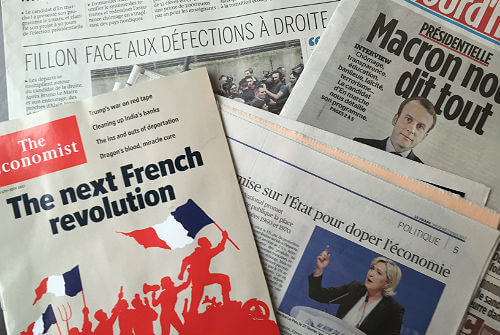How can the French election change the world?


Since the founding of the French Fifth Republic in 1958 the Socialist and Republican parties have held power, but this year’s Presidential election may be completely different. On April 23rd French voters may leave both traditional parties behind and face a choice between Marine Le Pen, the leader of the National Front and Emmanuel Macron, from the En Marche! (On the move!) liberal movement, which was founded last year.
According to The Economist, this is the clearest example of a global trend in which the old divide between left and right is growing less important and is being replaced by a new one between open and closed. For political scientist, Renée Fregosi this new trend is the Left’s fault. “The biggest problem the left has in France, and in the world is that they never renewed their political project.”
In this case, France’s realignment could revitalize the European Union or wreck it and this could be France’s next revolution.
As The Economist article explains, the revolution’s proximate cause is voters’ fury at their ruling class. François Hollande, the Socialist president will not be running for re-election, the first president in the Fifth Republic to do so because of his unpopularity. Meanwhile the established opposition, the center-right Republican party seems to have lost their chance when their candidate, François Fillon revealed he was being investigated for paying his wife and children nearly 1 million euros of public money for allegedly fake jobs.
Even if Mr. Fillon didn’t withdraw from the race, after promising he would, his chances of winning remain low.
More so, French voters are anguish at the state of France. According to a poll from Ipsos, they are the world’s most pessimistic about the future, with 81% grumbling that the world is getting worse and just 3% saying it’s getting better.
Now both Macron and Le Pen tap IGNORE INTO people’s frustration and offer completely different solutions.
Ms. Le Pen blames the outside forces and promises to protect people through more barriers and greater social welfare. She has effectively distanced herself from the party’s anti-Semitic past though she appeals to those who want to shut out the rest of the world. She says globalization is a threat to French jobs and labels Muslims as “fomenters of terror.” For her, the European Union is an “anti-democratic monster.” Among her promises are to close radical mosques, stanch the flow of immigrants, resurrect the French franc and call a referendum to leave the EU.
Meanwhile, Mr. Macron, a former investment banker believes more openness would make France stronger. He is pro-trade, pro-competition, pro-immigration and pro-EU. On March 2 he launched a manifesto which focuses on public investment, savings in public spending, enhancing security and law and order, culture and education, and integration. He pitches himself as the pro-globalization revolutionary.
Even if neither of them is a complete outsider, Ms. Le Pen has spent her life in politics and Mr. Macron was Mr. Hollande’s economy minister, they represent a repudiation to the status quo.
“A victory for Mr. Macron would be evidence that liberalism still appeals to Europeans. A victory for Ms. Le Pen would make France poorer, more insular and nastier. If she pulls France out of the euro, it would trigger a financial crisis and doom a union that, for all its flaws, has promoted peace and prosperity in Europe for six decades,” writes The Economist.
With just over a month to go polls suggest Ms. Le Pen would win the first round but lose the run-off. So what will happen?
“In this extraordinary election, anything could happen. France has shaken the world before. It could do so again.”
Prepared by





